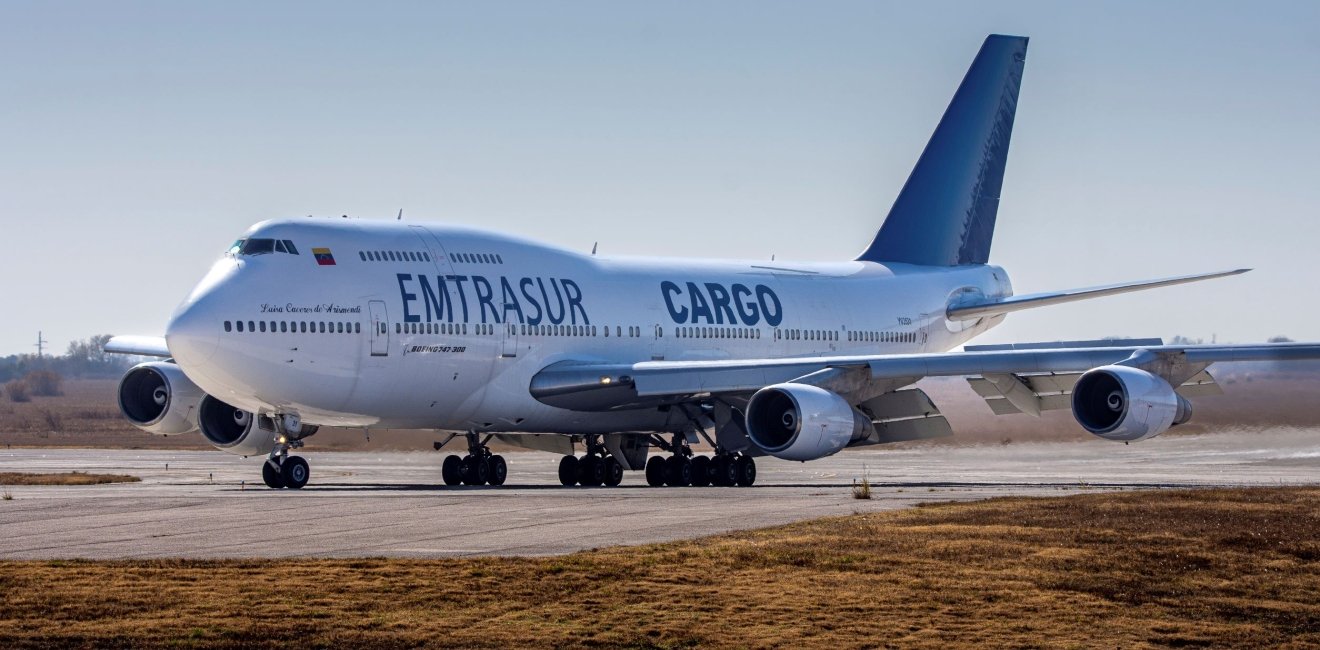
A blog of the Latin America Program
In June, Argentina’s political and media establishment took a break from its usual preoccupation – the country’s ever worsening political and economic crisis – and focused on a different plotline, the mysterious story of a Venezuelan cargo aircraft detained at Buenos Aires’s main airport.
As new facts emerged, the drama had irresistible elements: the presence of Iranians onboard, news that the aircraft was originally Iranian-owned, connections with Iran’s Islamic Revolutionary Guard Corps, allegedly ignored warnings from Western intelligence agencies, fumbling reactions by Argentina’s government, and an investigating judge seemingly in no hurry to release the plane and its crew. Beyond its cinematic character, this episode raised serious issues both about the extent of Venezuela’s connection with Iran and about Argentina’s continuing vulnerabilities nearly three decades after Iran-backed terrorists bombed a Jewish community center in the Argentine capital.
A Cargo Plane with a Surprising Crew
On June 6, a 747 cargo aircraft belonging to EMTRASUR, a subsidiary of Venezuelan state-owned airline CONVIASA, landed in Buenos Aires, apparently bringing auto parts from Querétaro, Mexico to an Argentine supplier of the Volkswagen Group. The aircraft had initially been unable to land at Buenos Aires because of inclement weather and was diverted to Córdoba, 400 miles away. After finally arriving in Buenos Aires, it needed to refuel, as it no longer was able to make it to its planned refueling stop in Bolivia. Denied fuel in Argentina over concerns about U.S. sanctions against Venezuela, the plane departed two days later for Uruguay or Paraguay, but it was not permitted to land in either country. Instead, it returned to Buenos Aires, where it remains today.
According to press reports, Argentina’s Airport Security Police searched the aircraft. It emerged that it had been purchased by the Venezuelan state-owned airline from an Iranian state-owned airline, first identified as Mahan Air and later as Fars Qeshm Air. Aboard the plane were not only 12 Venezuelans, but also seven Iranians. Argentine authorities detained the plane and seized the crew’s passports while judicial authorities investigated. They identified one member of the crew as Gholamreza Ghasemi, an Iranian linked to the Islamic Revolutionary Guard Corps, a powerful Iranian military service, separate from the regular army, which operates the Quds Force and is considered a terrorist organization by the U.S. government.
With the plane and its crew marooned in Argentina, journalists have asked pointed questions of the national government.”
With the plane and its crew marooned in Argentina, journalists have asked pointed questions of the national government, all coming at a particularly inconvenient time as Argentina’s spiraling inflation has been coupled with an ugly power struggle between President Alberto Fernández and his predecessor and vice president Cristina Fernández de Kirchner. The authorities were hard pressed to explain the presence of the Iranians, and why the airplane had been allowed to land in Argentina while its neighbors Uruguay and Paraguay were unwilling to let it enter their territory.
The authorities were hard pressed to explain the presence of the Iranians, and why the airplane had been allowed to land in Argentina.”
Nothing to See Here
The government’s immediate response was denial. It suggested that Ghasemi was a victim of mistaken identity, and that the Iranians on board were merely trainers helping the Venezuelan crew learn the ropes on the recently purchased plane. Officials said they had no prior information that should have prevented the plane from entering Argentina.
These initial efforts at damage control did not hold up for long. After all, both the United States and Israel had reportedly provided information about the plane’s Iranian connections and about Ghasemi, who had served as chief executive officer of Fars Qeshm Air, which the United States accuses of supplying arms and sensitive equipment to Iran’s proxies in Syria and Lebanon. Turkish and Brazilian authorities also reportedly provided Argentina information on the aircraft and its Iranian connections.
So why did Argentina welcome the plane? Why was the Airport Security Police aggressive in searching the plane and initiating an investigation while the Federal Intelligence Agency was apparently disengaged? Why does the Argentine government, even after backing away from its initial assertions, still say the plane and its crew will soon be released?
Amid this confusion in Argentina, the plane is having ripple effects internationally. Iran and Venezuela have called for its release, attributing the seizure to American and Israeli machinations. Uruguayan and Paraguayan authorities are highlighting their swift action in refusing entry to the plane, though it appears that the 747 landed in Paraguay at least once previously. In Chile, opposition politicians have complained that the cargo plane has landed in that country on several occasions, and demanded explanations from authorities.
Painful History
In Argentina, the saga of the aircraft struck particularly sensitive nerves. The Iran-backed terrorist group Hezbollah has well-documented ties to the “tri-border” region where Argentina, Paraguay and Brazil meet. The region is also a hotspot for customs evasion, counterfeiting and drug smuggling.
Of the three countries, however, Argentina alone has been victim of international terrorism with roots in the Middle East. In 1992, terrorists used a truck bomb to destroy the Israeli Embassy in Buenos Aires, killing 29. The Islamic Jihad Organization, a group linked to Hezbollah and Iran, claimed responsibility. Two years later, a similar Hezbollah-backed attack on the Jewish community center in Buenos Aires (known by its Spanish initials as the AMIA) led to 85 deaths. The AMIA case has been a political football in Argentina for the last 28 years. The initial investigation was bungled, as prosecutors sought local suspects despite clear evidence pointing to Iran.
The AMIA case has been a political football in Argentina for the last 28 years.”
Ultimately, Argentina identified suspects, and INTERPOL issued “red notices” targeting, among others, several Iranians who later held senior government posts. But Argentina’s interest in the case has been sporadic. During the presidency of Cristina Fernández de Kirchner, Argentina pursued a controversial memorandum of understanding with Iran to cooperate in the investigation after years of failed attempts to persuade Tehran to turn over the alleged bombers. The agreement was widely seen as an effort to quash the investigation, and it was never implemented. The AMIA investigation was also interrupted by the death of the chief investigator, Alberto Nisman, who was found shot in his apartment in 2018. His death was originally ruled a suicide, but many believe he was murdered.
In this context, it is no surprise that the appearance in Buenos Aires of a plane carrying Iranians with potential links to terrorism was noteworthy – and has the potential to be politically explosive.
It is no surprise that the appearance in Buenos Aires of a plane carrying Iranians with potential links to terrorism was noteworthy – and has the potential to be politically explosive.”
Venezuela’s Links with Iran…
It is hardly news that Venezuela and Iran maintain close ties. At the political and ideological level, both view the United States as their principal adversary. (Venezuela’s strong anti-Israel position is also an element of convergence.) Iran has played a role in Venezuela’s partially successful efforts to raise oil production, depressed by decades of political turmoil, corruption and sanctions. But the fact that this aircraft was purchased by Venezuela from Iran, and carried an Iranian crew, suggests a potentially deeper relationship than previously understood, and a wide set of potential motives for the flight.
… and with Argentina
As for Argentina’s relationship with Venezuela, it has been close in recent years whenever Peronists control the Casa Rosada. This was most recently demonstrated at the Summit of the Americas in June, where Fernández criticized his U.S. hosts for failing to invite Nicolás Maduro. Under the last Peronist administration, the relationship came under scrutiny in Argentina, after a Venezuelan businessman was apprehended at a Buenos Aires airport in 2007 trying to bring almost $800,000 in cash into the country, allegedly for Fernández de Kirchner’s presidential campaign.
Unanswered Questions
As of now the aircraft and its crew remain stranded, awaiting the outcome of the judicial investigation. The story has faded from the headlines, overtaken by new crises, notably the resignation of Argentina’s finance minister. Nevertheless, even if the plane and its crew are released, there will be pressure for the investigation to continue. That could reveal new details about the Iran-Venezuela-Argentina triangle and the contemporary threats from terrorism in South America.
Author

Former member of the Senior Foreign Service of the U.S. Department of State

Latin America Program
The Wilson Center’s prestigious Latin America Program provides non-partisan expertise to a broad community of decision makers in the United States and Latin America on critical policy issues facing the Hemisphere. The Program provides insightful and actionable research for policymakers, private sector leaders, journalists, and public intellectuals in the United States and Latin America. To bridge the gap between scholarship and policy action, it fosters new inquiry, sponsors high-level public and private meetings among multiple stakeholders, and explores policy options to improve outcomes for citizens throughout the Americas. Drawing on the Wilson Center’s strength as the nation’s key non-partisan policy forum, the Program serves as a trusted source of analysis and a vital point of contact between the worlds of scholarship and action. Read more


Argentina Project
The Argentina Project is the premier institution for policy-relevant research on politics and economics in Argentina. Read more

Explore More in Weekly Asado
Browse Weekly Asado
Dengue Haunts South America’s Summers

Lessons from Costa Rica’s Economic Transformation

Women and Latin America’s Digital Revolution

